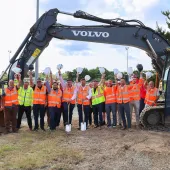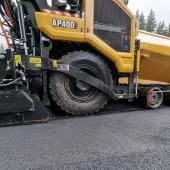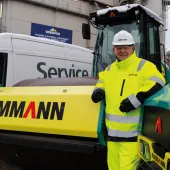Roll With It

Rapid International equipment selected for roller-compacted concrete paving in US
Using mobile continuous mixing plants supplied by Co. Armagh-based Rapid International Ltd, US contractors such as Complete General Construction and Nickolas Savko & Sons Inc., in Ohio, are increasingly switching over to roller-compacted concrete (RCC) applications for roads and pavements.
The city of Columbus, in Ohio, has experienced a rapid growth in recent years in the use of RCC for the city streets and highways since RCC construction procedures were first introduced to the area in 2001. Using Rapid International’s mobile continuous twin-shaft plants to mix the concrete, and high-density pavers and rollers to lay it, roller-compacted concrete is becoming a popular choice for projects due to its strength, the speed of its construction and its economic value in comparison to asphalt.
For many years, Columbus had made use of ‘composite’ pavement designs, where concrete was used as the pavement base, and asphalt for the pavement surface, but with the introduction of RCC, dozens of successful projects have been completed.
For example, Complete General Construction have commenced work on a highway network in the city. Using a mobile continuous mixing plant, supplied by Rapid International Ltd, along with specialized paver and vibratory rollers, the contractor has started laying RCC which will provide long serviceability with minimal maintenance.
Why choose RCC over asphalt?
Although RCC has the same ingredients as conventional concrete, it is a drier mix and is stiff enough to be compacted by vibratory rollers. It has a high flexural strength (500-1,000 lb/in2) (3.5-7.0MPa) so that it can support heavy, repetitive loads without failure and spans localized soft subgrade areas, which reduces maintenance costs and downtime.
RRC also has a high compressive strength (4,000-10,000 lb/in2) (28-69MPa), allowing it to withstand high concentrated loads and impacts from heavy industrial, and mining applications. Its high density and low absorption provide durability, even under freeze-thaw conditions and eliminate seepage through the pavement.
As RCC is constructed with no joints, there is no requirement for steel reinforcing or dowels, forms or finishing or sawed joints. Construction is speedy and simplified - reducing costs, minimizing labour and eliminating the need for preventative measures to minimize corrosion of reinforcing steel.
RCC itself is as economical and simple to use as asphalt. Contractors General Construction and Nickolas Savko & Sons, Inc., who are involved in many RCC projects, recognize the potential life-cycle cost savings when using concrete as opposed to asphalt.
The high strength of RCC pavements eliminates common and costly problems traditionally associated with asphalt, including the durability to resist freeze-thaw damage. The pavements will not deform under heavy, concentrated loads and do not deteriorate from spills of fuels and hydraulic fluids. They will also not soften under high temperatures.
Stages of RCC and use of the mobile continuous mixing plant
According to Rapid International, their Rapidmix mobile continuous twin-shaft plant has been specifically designed to ensure RCC projects are carried out on time and within budget. It produces high outputs of up to 400-600 tonnes from the 400C and 600C models and provides the mixing efficiency needed to evenly disperse the relatively small amount of water used in the mixing of roller-compacted concrete.
The RCC is transported by dumptrucks and discharged into a paving plant, which places the material in layers up to 10in (250mm) thick and 42ft (13m) wide. Compaction begins immediately after placement, which is how the concrete attains its level of smoothness, density, surface texture and strength. This stage continues until the density requirements are met.
The final stage of the process is curing where moisture is applied, allowing hydration of the concrete, thus causing it to harden and strengthen. The plant can work on a variety of applications such as bentonite landfill sealing, dam construction and contaminated soil stabilization, as well as cement-treated base for road construction.
Due to its superior strength, RCC can be used in industrial applications where strong pavement is required to stand up to massive loads and specialized equipment. Airport runways and aprons are well suited to RCC, as are parking, storage and warehouse floors; container storage and handling; and port pavements.








